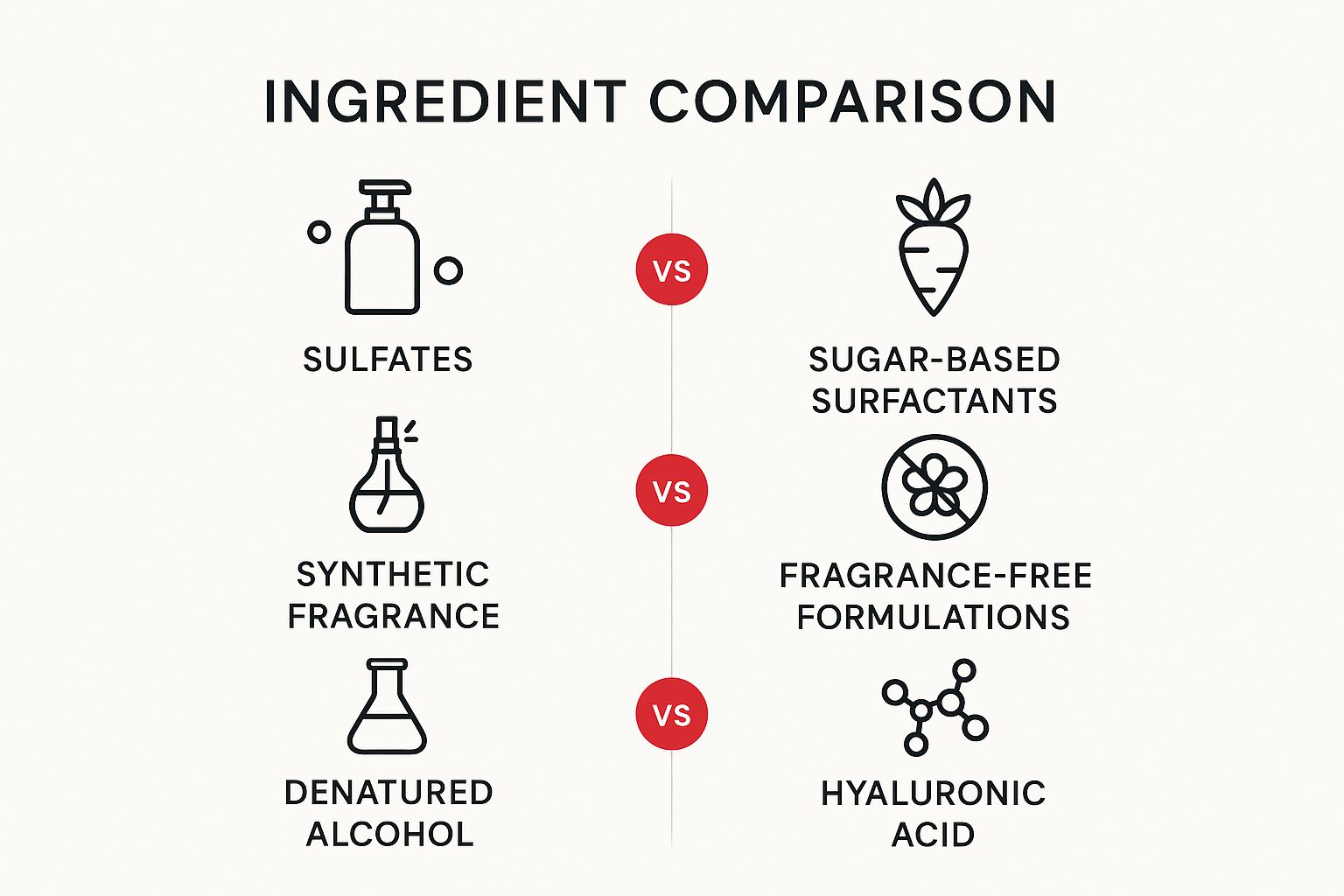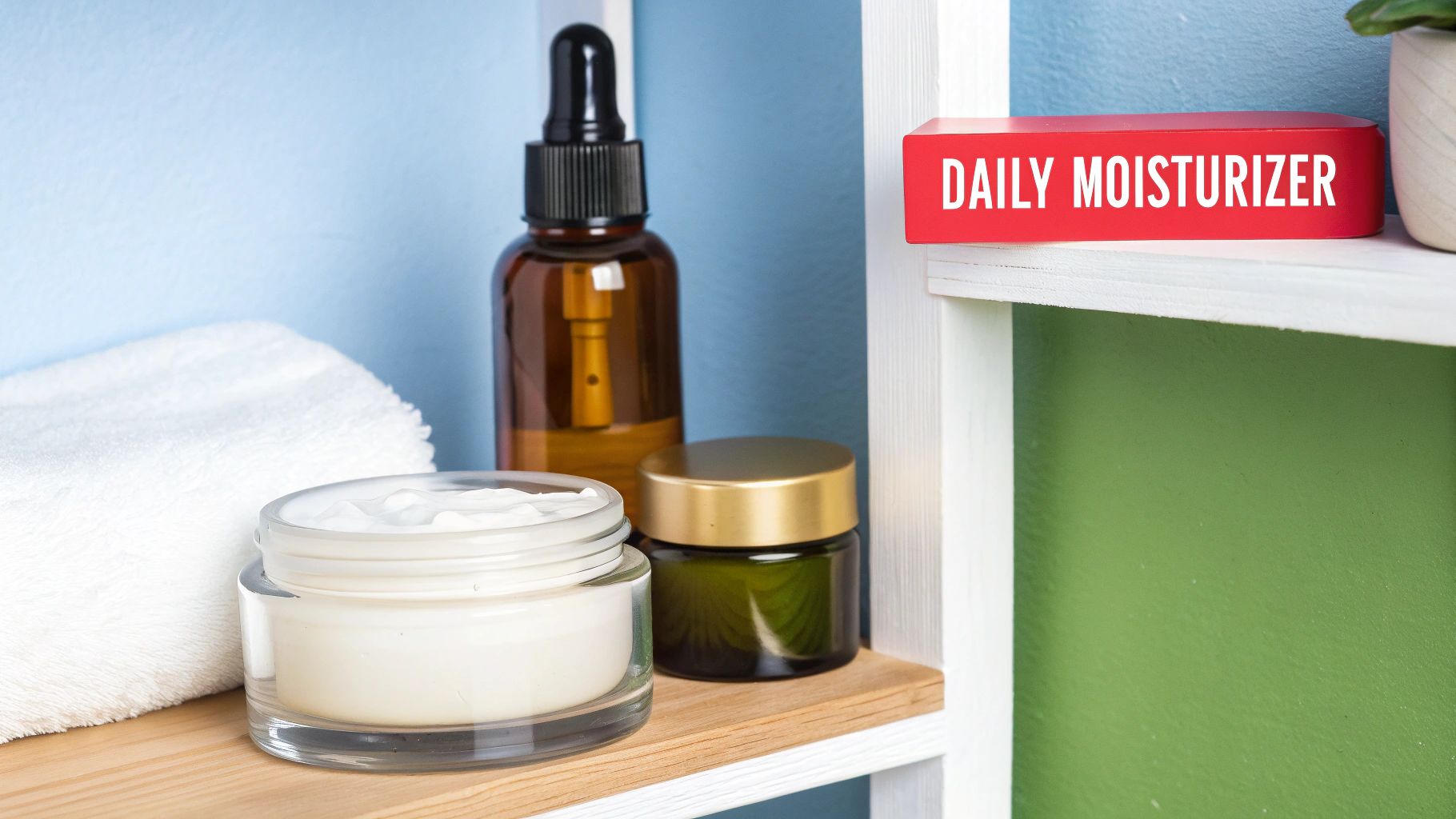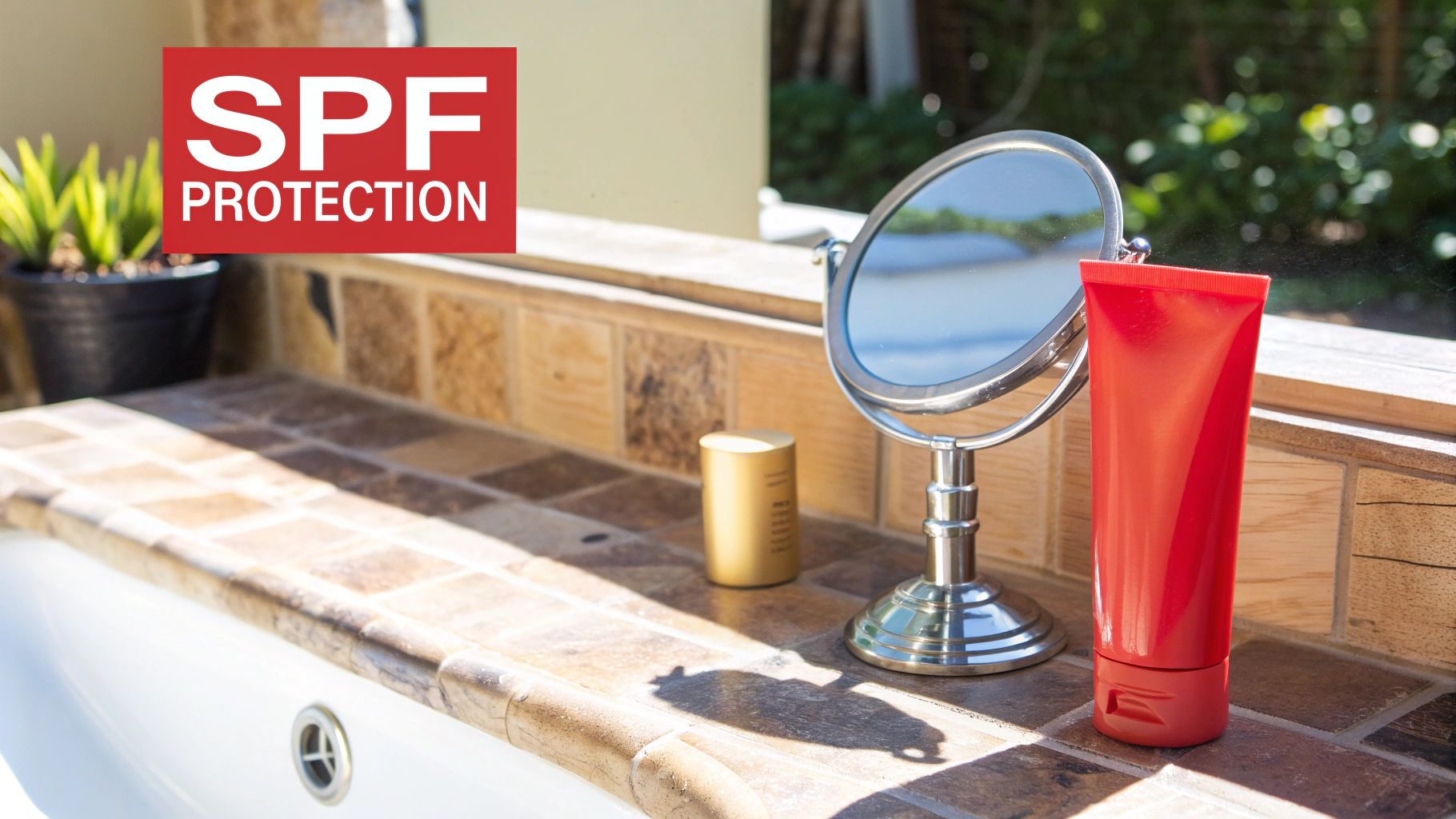
Skincare Routine for Sensitive Skin
Share
Understanding Your Sensitive Skin (And Why It's Different)
Sensitive skin isn't simply the occasional redness or flush. It's a complex combination of factors that can result in ongoing discomfort. This means understanding the root causes of your sensitivity is key to creating a skincare routine that truly works. Do you feel stinging when you apply certain products? Does your skin feel tight and dry after cleansing? Or perhaps it reacts in unexpected ways to weather changes? These are all common indicators of sensitive skin.
At Lulumine, we understand that sensitive skin requires more than just gentle products — it calls for a mindful approach to beauty that nurtures both skin and spirit. Rooted in clean, vegan, and cruelty-free principles, our skincare philosophy celebrates radiant skin as a reflection of self-care and self-love. In this guide, we explore how to create a skincare routine that honours your skin’s natural balance and supports long-term skin health — helping you embrace your natural glow with confidence.
Recognizing True Sensitivity
It's important to distinguish between truly sensitive skin and temporary skin reactions. Overdoing it with harsh products or encountering environmental triggers like pollution can sometimes mimic the symptoms of sensitive skin. However, true sensitive skin usually involves a weakened skin barrier. Think of your skin barrier as your skin's first line of defense. When it's compromised, irritants can penetrate more easily, causing redness, dryness, and inflammation.
The Science Behind the Sensitivity
The stratum corneum, your skin's outermost layer, plays a vital role in protecting you from external aggressors. For those with sensitive skin, this layer is often more permeable than in others. This increased permeability allows essential moisture to escape, while also letting irritants in more easily. This explains why sensitive skin can feel drier and more reactive.
Sensitive Skin in the UK
Growing awareness of sensitive skin, combined with the increasing popularity of natural and organic skincare, is fueling the demand for specialized products in the UK. The global sensitive skincare market is expected to grow at a CAGR of around 9.1% from 2024 to 2025, driven by consumers, influencers, and dermatologists alike. Find more detailed statistics here. This expanding market reflects the growing need for products designed specifically for sensitive skin, addressing the unique challenges faced by individuals in the UK, such as hard water and the drying effects of central heating. Understanding your skin’s specific needs, particularly in relation to the UK environment, is the first step towards a truly effective skincare routine.
Your Gentle Morning Routine That Actually Works
A truly effective morning routine for sensitive skin goes beyond mere gentleness. It's about creating a strategic approach to protect and nourish your delicate complexion. Let's explore a step-by-step routine designed to set your sensitive skin up for a day of comfort and radiance.
Cleansing: Starting Fresh Without the Irritation
Begin your day with a refreshing cleanse using lukewarm water. Avoid hot water, as it can strip away your skin's natural oils, exacerbating sensitivity and dryness. Select a cleanser specifically formulated for sensitive skin—ideally one that's fragrance-free and sulfate-free. Even cleansers marketed as "gentle" can contain harsh ingredients. LULUMINE's Sensitive Skin Oil to Milk Cleanser offers a luxurious experience, transforming from a silky oil into a milky texture to effectively remove impurities without disrupting your skin's protective barrier.
Hydration: Replenishing Your Skin's Moisture Barrier
After cleansing, gently pat your skin dry—resist the urge to rub! Immediately follow up with a hydrating serum. Hyaluronic acid is a star ingredient to seek out, thanks to its remarkable ability to attract and retain moisture. This leaves your skin feeling plump and hydrated. Think of it as a moisture magnet, drawing hydration to your skin.
Protection: Shielding Your Skin from the Elements
Next, apply a lightweight, fragrance-free moisturizer to seal in the hydration from your serum and further fortify your skin's barrier. This step is especially important for sensitive skin, as a robust barrier helps prevent irritants from penetrating. Finally, apply a broad-spectrum sunscreen with an SPF of 30 or higher. Sunscreen is essential, even on cloudy days, as UV rays can still reach and irritate sensitive skin. This final step acts as your shield against environmental aggressors.
Timing and Technique: Mastering the Application Process
The order in which you apply your products and your application technique are just as vital as the products themselves. Applying products in the right sequence ensures optimal absorption and synergistic effects. Avoid rubbing or tugging, especially around the delicate eye area. Instead, gently pat or press products into your skin to minimize friction and reduce the risk of irritation.
Ingredient Awareness: Knowing What to Avoid (and Embrace)
Navigating the world of skincare ingredients can feel daunting when you have sensitive skin. The infographic below provides a visual guide to identifying ingredients to seek out and those to steer clear of.

Gentle alternatives, like sugar-based surfactants and fragrance-free formulations, are much kinder to sensitive skin. Harsh ingredients, such as sulfates, synthetic fragrances, and denatured alcohol, can trigger irritation. Opt for ingredients that nurture your skin’s natural balance. Avoid harsh active ingredients like retinoids and AHAs in your morning routine; reserve these for your evening routine.
To further guide your product choices, take a look at this helpful comparison:
Morning Routine Product Comparison for Sensitive Skin: A detailed comparison of gentle morning skincare products, highlighting key ingredients to seek and avoid.
|
Product Type |
Recommended Ingredients |
Ingredients to Avoid |
Application Tips |
|---|---|---|---|
|
Cleanser |
Sugar-based surfactants, Aloe vera, Chamomile |
Sulfates, Synthetic fragrances, Denatured alcohol |
Gently massage onto damp skin, rinse with lukewarm water |
|
Serum |
Hyaluronic acid, Ceramides, Niacinamide |
Alcohol, Essential oils, Fragrances |
Apply a few drops to cleansed skin and pat gently |
|
Moisturizer |
Ceramides, Glycerin, Shea butter |
Synthetic fragrances, Dyes, Parabens |
Apply evenly to face and neck after serum |
|
Sunscreen |
Zinc oxide, Titanium dioxide |
Oxybenzone, Octinoxate, PABA |
Apply liberally 15 minutes before sun exposure |
This table summarizes key ingredients to embrace and avoid in your morning skincare routine, empowering you to make informed choices that support your sensitive skin. By following these tips, you can cultivate a morning routine that truly works for you, promoting a healthy, radiant, and comfortable complexion.
Evening Care: When Your Skin Does Its Best Work
Your evening skincare routine is a sacred ritual, especially for sensitive skin. While your morning routine focuses on shielding your skin from the day's challenges, your evening routine is dedicated to repair and rejuvenation. Let's explore how to create a nighttime haven that nurtures your skin's natural healing processes.
Makeup Removal: A Gentle Approach
The first step in your evening ritual is makeup removal. Harsh rubbing or scrubbing can irritate sensitive skin, so opt for a gentle approach. An oil-based cleanser or micellar water can effectively dissolve makeup and impurities without stripping your skin's natural oils. Micellar water contains tiny micelles that attract and lift away makeup and dirt, making it a quick and easy option. For a truly pampering experience, consider LULUMINE's Sensitive Skin Oil to Milk Cleanser, which gently melts away makeup, leaving your skin feeling clean and balanced.

Cleansing: The Second Cleanse
While makeup removal addresses surface impurities, a second cleanse ensures a truly deep clean. Choose a mild, fragrance-free, sulfate-free cleanser designed for sensitive skin. This step removes any lingering residue or pollutants, preparing your skin for the next steps. Remember to use lukewarm water and pat your skin dry gently to avoid irritation.
Targeted Treatments: Maximising Your Skin's Recovery
Nighttime is the perfect time for targeted treatments. As your skin regenerates overnight, applying treatments before bed allows them to work their magic while you sleep. If you are using retinoids or other active ingredients, start slowly, applying them every other night or even less frequently. Gradually increase the frequency as your skin adjusts.
Hydration and Moisturisation: Locking in the Goodness
After cleansing and treating, replenish your skin's moisture with a hydrating serum followed by a moisturizer. Hyaluronic acid, ceramides, and niacinamide are gentle yet powerful ingredients known to benefit sensitive skin. They work together to hydrate, soothe, and strengthen your skin's protective barrier, preventing moisture loss throughout the night. LULUMINE's Sensitive Skin Moisturiser is specially formulated for sensitive skin, offering deep hydration without causing irritation.
Creating the Right Sleeping Environment
Your sleeping environment can also affect your sensitive skin. A cool room temperature prevents overheating and potential inflammation. Maintaining adequate humidity, especially during dry winter months, is also important. A humidifier can add moisture to the air if needed. By creating a calming and supportive environment, you enhance your skin’s ability to repair and regenerate overnight, contributing to a healthier, more resilient complexion.
Product Selection: The Heroes And Villains Guide
Finding the perfect products for sensitive skin can feel like searching for a needle in a haystack. Deciphering complicated ingredient lists and wading through marketing jargon can make the process even more daunting. But don't worry, this guide will empower you to choose products that will soothe and protect your sensitive skin, not irritate it.
Identifying Your Skin's Allies: The Hero Ingredients
Some ingredients are naturally beneficial for sensitive skin, working to soothe and strengthen its delicate barrier. Ceramides, for instance, are lipids that occur naturally in your skin. They help maintain a healthy skin barrier, much like mortar between bricks. This helps prevent moisture loss and keeps your skin healthy and resilient.
Hyaluronic acid is another powerful ingredient for sensitive skin. It acts like a sponge, drawing moisture into the skin to keep it plump and hydrated. This can be especially helpful for sensitive skin, which is often prone to dryness and irritation.
Finally, niacinamide is a true hero ingredient for calming redness and inflammation. It helps soothe irritated skin and improve its overall resilience, creating a healthier, more balanced complexion. For a deeper dive into sensitive skincare routines, check out this article: How to master your sensitive skincare routine with the right moisturiser.
Unmasking the Villains: Ingredients to Avoid
Just as there are hero ingredients, there are also villains that can wreak havoc on sensitive skin. Fragrances, even those labeled "natural," are a common culprit. They can trigger redness, itching, and breakouts.
Sulfates, often found in cleansers, can strip the skin of its natural oils, leading to dryness and discomfort. And alcohol, particularly denatured alcohol, can disrupt the skin's protective barrier, increasing sensitivity and susceptibility to irritation.
Decoding the Marketing Maze: Understanding Concentration Levels
The concentration of an ingredient is just as important as the ingredient itself. Even a typically "gentle" ingredient can irritate sensitive skin if the concentration is too high. For example, while a low concentration of salicylic acid can benefit acne-prone sensitive skin, a high concentration may be too harsh.
Pay close attention to where an ingredient falls on the ingredient list. Ingredients are listed in descending order of concentration, so those at the beginning are present in the highest amounts.
Patch Testing: Your Safety Net for New Products
Patch testing is a simple yet vital step before introducing any new product to your routine. It can prevent widespread reactions and save your skin from unnecessary irritation. Apply a small amount of the product to a discreet area, such as your inner wrist or behind your ear. Wait 24-48 hours to observe any reaction. If your skin remains calm, it's generally safe to use the product on your face.
The UK Skincare Market: Navigating the Options
The UK facial skincare market offers a vast selection, but finding the right products for sensitive skin takes careful consideration. While the market's growth has slowed recently, there are still plenty of opportunities for brands that focus on personalized solutions. Value sales in the UK skincare market actually increased by 7.9% in 2024, showcasing the strong demand for products that cater to individual needs. Learn more about this market trend.
Seek out brands that prioritize gentle formulations and specifically cater to sensitive skin, like LULUMINE, which offers vegan and cruelty-free products designed for delicate complexions. By combining careful ingredient selection, patch testing, and an awareness of UK market trends, you can create a skincare routine that perfectly supports your sensitive skin's unique needs.
Mistakes That Sabotage Your Sensitive Skin Progress

Even with the best intentions, caring for sensitive skin can be tricky. It's easy to unintentionally cause irritation, which makes understanding common mistakes vital for achieving a comfortable, healthy complexion. Let's uncover some pitfalls to avoid on your journey to radiant skin.
Over-Cleansing: Stripping Away More Than Just Dirt
Cleansing is essential for healthy skin, but over-cleansing can strip away your skin's natural, protective oils. This disrupts its delicate balance and can lead to increased dryness and irritation. It can even trigger your skin to produce more oil to compensate, exacerbating the problem. Cleansing more than twice a day can be counterproductive, especially for sensitive skin.
You might be interested in: How to master your sensitive skincare routine with the right cleanser.
Ignoring UK Environmental Factors
Environmental challenges specific to the UK can worsen sensitive skin. Hard water, common in many areas, can leave a residue that irritates sensitive skin. Central heating during the colder months dries the air, leading to dehydrated and uncomfortable skin. Consider using a humidifier or water softener to address these factors and improve your skin's condition.
The "More Is More" Myth
It's tempting to layer on multiple products when dealing with skin sensitivity, but this can backfire. Overloading your skin with numerous ingredients, even those labeled "gentle," increases the risk of irritation and reactions. A simplified routine with carefully selected products is often more effective than a complex, multi-step approach. Focus on quality over quantity.
Hidden Irritants in Your Routine
Sometimes, the causes of skin reactions are hiding within your daily routine. Synthetic fragrances, dyes, and even certain preservatives can trigger inflammation and discomfort. Harsh exfoliants, while beneficial for some, can be overly abrasive for sensitive skin, damaging its protective barrier. Identifying and eliminating these hidden irritants can significantly reduce sensitivity.
Neglecting Patch Testing
Introducing new products without patch testing is risky for sensitive skin. Patch testing allows you to see how your skin reacts to a small amount of product before applying it to your entire face. This simple step prevents widespread reactions and helps you build a routine with truly compatible products. A 24-48 hour patch test on your inner wrist can save you from potential discomfort.
Navigating The UK Skincare Market Like A Pro

Finding the perfect skincare routine for sensitive skin can be a journey. But in the UK, you're surrounded by an abundance of options designed just for you. With the right knowledge, you can discover products that truly nurture and protect your delicate complexion. Embrace the process of finding what works best for your skin.
From High Street To Specialist: Finding Your Sensitive Skin Haven
The UK offers a diverse retail landscape, from convenient high-street options to specialized stores. Boots and Superdrug provide access to affordable, trusted brands, making it easy to start building your routine. For a more tailored experience, consider exploring retailers like Holland & Barrett. Their focus on natural and organic products opens doors to a wider world of gentle formulations.
UK Brands Leading The Way In Gentle Skincare
The UK is home to innovative brands pioneering gentle skincare solutions. Pai Skincare and LULUMINE, with their emphasis on plant-based ingredients, exemplify this commitment to sensitive skin. What’s even better, these locally-crafted products are often formulated with the unique UK climate in mind, taking into account factors like hard water and unpredictable weather patterns. You can trust these brands understand your skin's needs.
To illustrate the growing demand, let's take a look at the promising market growth.
|
Year |
Market Value (£ Million) |
Growth Rate (%) |
Key Drivers |
|---|---|---|---|
|
2023 |
1,856.7 |
- |
Increased awareness and demand |
|
2030 (Projected) |
3,421.0 |
- |
Continued growth in demand |
This data highlights the impressive growth trajectory of the sensitive skincare market in the UK. The increasing awareness and demand for specialized products point to a bright future for those seeking gentle and effective skincare solutions. Explore this topic further.
Dermatologist Recommendations And NHS Pathways
Expert advice is within reach through the NHS and readily available resources. Consult your GP for a referral to an NHS dermatologist, unlocking personalized recommendations and potential prescriptions. Many high-street pharmacies also stock dermatologist-approved brands, offering convenient access to expert-backed solutions.
UK Skincare Regulations: Your Protection As A Consumer
UK skincare regulations provide an added layer of reassurance for sensitive skin individuals. Stringent standards ensure product safety and require clear ingredient labeling. This transparency empowers you to make informed decisions, confidently avoiding potential irritants.
Online Retailers And Return Policies: Shopping With Confidence
Online retailers offer another avenue for exploring sensitive skincare. Many specialize in curated selections and offer convenient delivery options. Seek out retailers with generous return policies, allowing you to experiment risk-free. Building a relationship with a knowledgeable pharmacist can also provide invaluable support. Their expertise can guide you through the often-overwhelming choices, helping you find the perfect match for your unique skin.
Building Long-Term Success (Without Perfection)
Consistency is the cornerstone of managing sensitive skin. While crafting the "perfect" routine is a tempting goal, life's realities often disrupt our best-laid plans. This section explores practical strategies for navigating these bumps in the road and maintaining healthy skin, even when perfection feels unattainable.
Adapting to Life's Changes
Life is a tapestry of change, woven with threads of seasonal shifts, travel adventures, stress, and hormonal fluctuations. These changes can significantly impact your skin, especially if it's sensitive. Dry winter air can worsen dryness, while stress can trigger inflammation and redness. Adapting your skincare routine to these evolving circumstances is vital for maintaining healthy skin.
During colder months, consider incorporating a richer moisturizer. When traveling, pack travel-sized versions of your trusted products to ensure consistency. If you're experiencing high stress, prioritize soothing ingredients like chamomile and aloe vera. These small adjustments can have a profound impact.
The Power of Regular Reviews
Regularly reviewing your skincare routine is as important as the routine itself. Think of it as a health check for your skin. Every few weeks, take time to assess how your skin is responding to your current products and routine. Are there any new sensitivities or irritations? Does your skin feel adequately hydrated? Are your current products still meeting your needs?
These regular check-ins empower you to identify what's working and what's not, allowing you to make informed adjustments for continuous improvement. Remember, your skin's needs change over time, so what worked previously may not be optimal now.
Seeking Professional Guidance
While many aspects of sensitive skincare can be managed at home, knowing when to seek professional advice is crucial. If you're facing persistent skin issues, like severe redness, itching, or unexplained breakouts, consult a dermatologist or GP. They can offer personalized guidance and identify any underlying conditions contributing to your skin’s sensitivity.
In the UK, you can access NHS dermatologists through your GP, benefiting from expert advice and potential access to prescription treatments tailored to your needs. Don't hesitate to reach out—professional guidance can greatly improve your skin's long-term health and comfort.
Tracking Your Progress
Tracking your skin's progress can be incredibly motivating, especially when results seem slow. Maintain a simple skincare journal or take regular photos to document changes over time. This allows you to visualize your journey and identify patterns that might not be readily apparent.
This visual record can also be valuable when consulting with a dermatologist or GP. It gives them a comprehensive overview of your skin's history and how it has responded to various products and treatments.
Staying Motivated on the Journey
Managing sensitive skin is a marathon, not a sprint. Some days your skin will look and feel fantastic, while other days might feel like a step back. During those challenging times, remember your progress and focus on the long-term benefits of your routine.
Celebrate small victories and practice patience. A consistent routine, regular reviews, and professional advice when needed will pave the path toward your skin goals. Don't let minor setbacks deter you from your journey to healthier, happier skin.
LULUMINE Essentials: Gentle, Vegan Skincare for Sensitive Skin
Recommended LULUMINE Routine for Sensitive Skin
-
Sensitive Skin Oil-To-Milk Cleanser
Effortlessly dissolves makeup and daily impurities without stripping or irritating your skin.
-
Hydrating Toner
Refreshes and hydrates, preparing your skin for maximum comfort and absorption.
-
Pigment Perfecting Serum
Targets uneven tone and dark spots with a gentle, non-irritating formula. -
Hydrating Serum
Delivers deep, soothing hydration using multi-molecular hyaluronic acid.
-
Sensitive Skin Moisturiser
Lightweight, calming hydration for all-day comfort. -
Niacinamide Gel Moisturiser
Supports the skin barrier, reduces redness, and balances oil—all without heaviness.
-
Ceramide Hydrating Night Cream
Replenishes and fortifies your skin barrier overnight for a calm, resilient complexion by morning.
Always patch test new products and introduce them one at a time. Stick to simple, gentle routines and avoid harsh exfoliants or strong actives unless your skin is ready.
